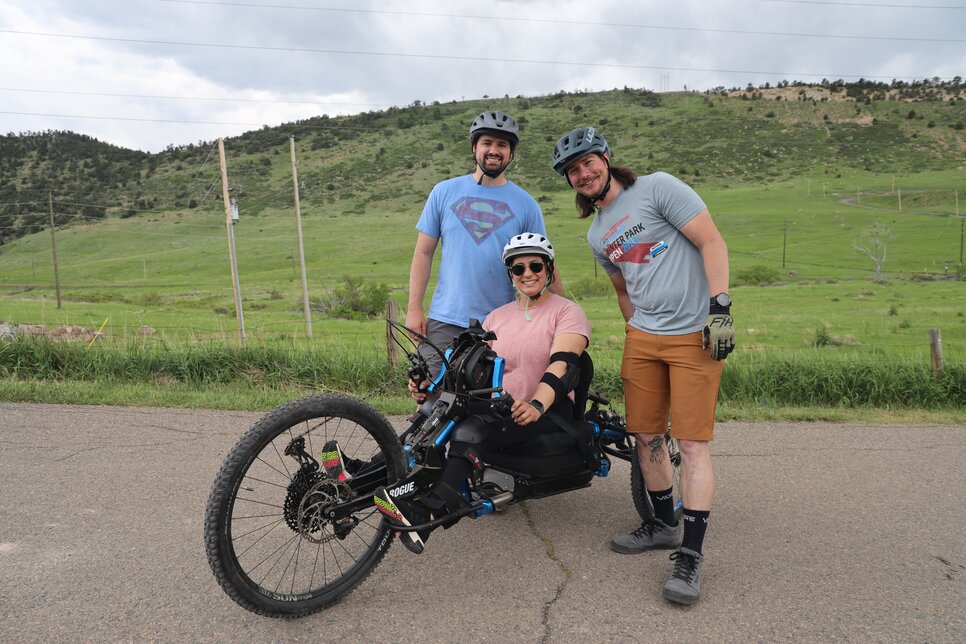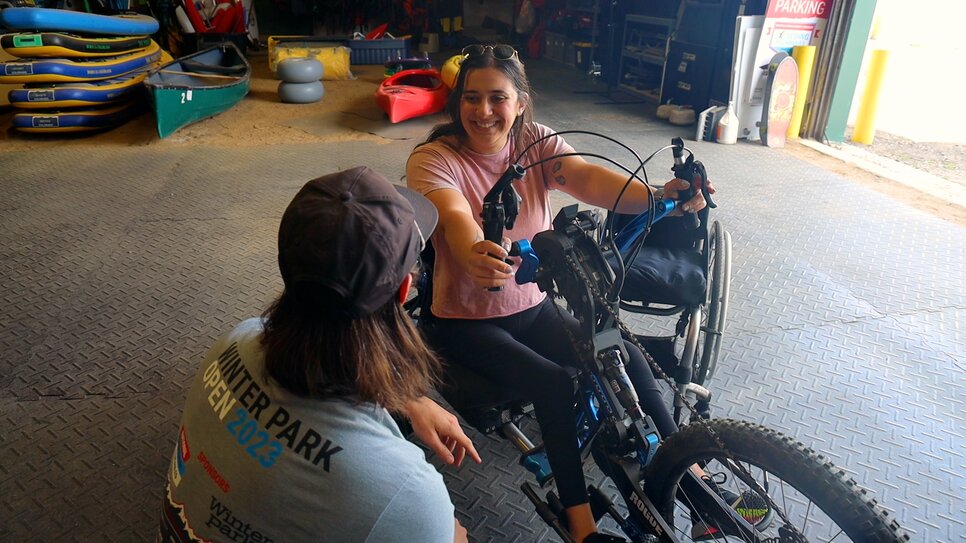For Liv Bender, adaptive mountain bikes allow for a return to the trails
share

LAKEWOOD, Colo. — Adaptive sports offer more than just inclusivity. They can bring freedom and independence to people like Liv Bender, 29, who tried adaptive mountain biking for the first time last month at Lakewood’s Green Mountain.
“I always say my wheelchair is my legs, and I have to use my arms and my hands for everything,” said Bender.
Adaptive Mountain bikes are now more accessible thanks to the newly implemented Adaptive Mountain Biking and Hand Cycling program at the National Sports Center for the Disabled (NSCD). The nonprofit started in 1970 by teaching people with disabilities how to ski. Since then, it has since expanded to offer programs like archery and rock climbing to those with disabilities.
Bender lost mobility below her navel 15 years ago following a diagnosis of transverse myelitis, an autoimmune disease.
“Honestly, I didn’t have that hard of a time adjusting to [using a wheelchair],” said Bender, an audiologist who helps people with hearing impairments.
“I love all of that nerdy stuff! I love being an audiologist because I get to help people. I love the combination of medicine and technology and how they come together,” said Bender. “I love building relationships with my patients and meeting new people every day!”
Bender has also become part of a women's group who identify as disabled and go on adventures around Colorado together.
“We do everything else any able-bodied person does, but I get to talk to women who are in a similar situation as me about things they only understand,” she said.

Liv Bender uses a recumbent-adaptive mountain bike at Green Mountain in Hayden Park. Jordan Atwell, right, is an instructor and adaptive mountain bike coordinator for NSCD.
Photo: Lindsey Ford, Rocky Mountain PBS
Photo: Lindsey Ford, Rocky Mountain PBS
Before Bender used her wheelchair full-time, she enjoyed hiking and biking. But there weren’t any adaptive sports for her to try in her hometown of Rockland County, New York. That changed when she moved to Colorado with her boyfriend, Adam Cord.
When Bender showed interest in mountain biking in Colorado, Cord did some research and found NSCD.
“Riding out on the trails reminded me of my life before my disability,” said Bender.
That same year, Cord started working at NSCD as the customer service group and database manager.
In 1970, NSCD started out as a one-time ski lesson for children with amputations from the Children's Hospital of Denver. Today, the NSCD can take children and adults with disabilities to a variety of winter and summer sports and activities.
Most of the trips and activities are covered through grants, donations, and fundraising, but participants must cover some of the cost. Bender paid $130 of the $250 cost for a four-hour private lesson using one of NSCD’s adaptive mountain bikes.
The adapted bikes, which are modified to meet riders’s specific needs, cost anywhere from $15,000 to $20,000 or more, depending on the model. Modifications can look like handcycles for those with lower limb impairments or recumbent bikes for those needing additional stability.
NSCD provided Bender with a hand-recumbent adaptive mountain bike that she can power with her hands. Bender can make turns, brake, speed up, slow down, and enjoy biking once again.

Jordan Atwell, the adaptive mountain bike coordinator for NSCD, fitted Liv Bender for the recumbent-adaptive mountain bike.
Photo: Lindsey Ford, Rocky Mountain PBS
Photo: Lindsey Ford, Rocky Mountain PBS
“These bikes are not cheap. They’re difficult for people to attain,” said Jordan Atwell, NSCD’s adaptive mountain bike coordinator, who launched the biking program this summer. “That is the whole reason why I wanted to create this program so that people have access to these things.”
NSCD owns six adaptive mountain bikes, nine fat-tire mountain bikes, and 15 road hand-cycle bikes like the one Bender now rides. In total, the organization’s bike collection is worth well over $100,000.
Participants can try adaptive mountain biking and other activities by purchasing NSCD’s private lessons and camps.
Atwell trained Bender on how to use an adaptive bike and said that during this time in June, the weather is great for outdoor activities. He was excited to take on the trails at Green Mountain Recreation Center in Hayden Park.
“My favorite part about riding that adaptive mountain bike is that it feels like it gives you a little more freedom than a wheelchair does,” she said. “I push the limits of places I can go with my chair. Being on an adaptive mountain completely goes past that. I can go faster, I can go up hills easier, downhill, and rocky terrains.”
There are hundreds of trails throughout the state of Colorado that are accessible to people who use special equipment such as wheelchairs for mobility. NSCD’s adaptive mountain bikes and other equipment is stored at their new location at the Jefferson County Fairgrounds.
“Whenever I see people doing these activities, and they’re really excited about it, it's awesome. A lot of nerves happen at the beginning, but you get people like Liv who are just ready to go and excited about it,” said Atwell.
Although the organization partners with local hospitals, the majority of people learn about NSCD through word of mouth, said Julie Taulman, NSCD’s CEO.
“The disability community is a small community. So, oftentimes, when someone has tried an activity, they go back and tell their friends,” she said. “There are a lot of people that probably just decided that mountain biking wasn’t something that they would ever be able to do.”
Taulman became involved in making sports accessible to disabled people after her son, Kyle, became disabled as a toddler when a cancerous tumor wrapped around his spine. Now a graduating senior studying electrical engineering at CU Boulder, Kyle Taulman represented Team USA as a Para-Alpine Skier in the 2022 Beijing Paralympics.
“[Growing up] I tried every sport that I possibly could,” said Kyle Taulman. “One thing that I’ve seen that helps pull people out of a dark space is adaptive sports. It lets you get out there. You could be as good, if not better, than anybody else in that sport.”
Like Bender, Kyle Taulman does not have mobility below his navel. But unlike Bender, he doesn’t remember walking because he was just two years old when he became paralyzed.
“As a kid, I always felt like anybody else,” he said.
“I believe adaptive sports put [Kyle] on the right path in life,” said his mother. “A lot of people with disabilities have depression and turn to drugs and alcohol and it weighs on the family to find activities to do together. I’m a true believer that adaptive sports helped to build [Kyle’s] independence and self-esteem in young adulthood.”
For Bender, mountain biking isn’t the only thing on her mind. She wants to explore more of Colorado’s natural landscape through other adaptive sports.
“There is always a way,” Bender said. “There is a way to do anything, it just requires a little adapting. Don’t be afraid. It is different — it will not be exactly the same as what able-bodied people are doing — but it might become a new hobby. Find out what you can do and try them because there is a way to do everything.”